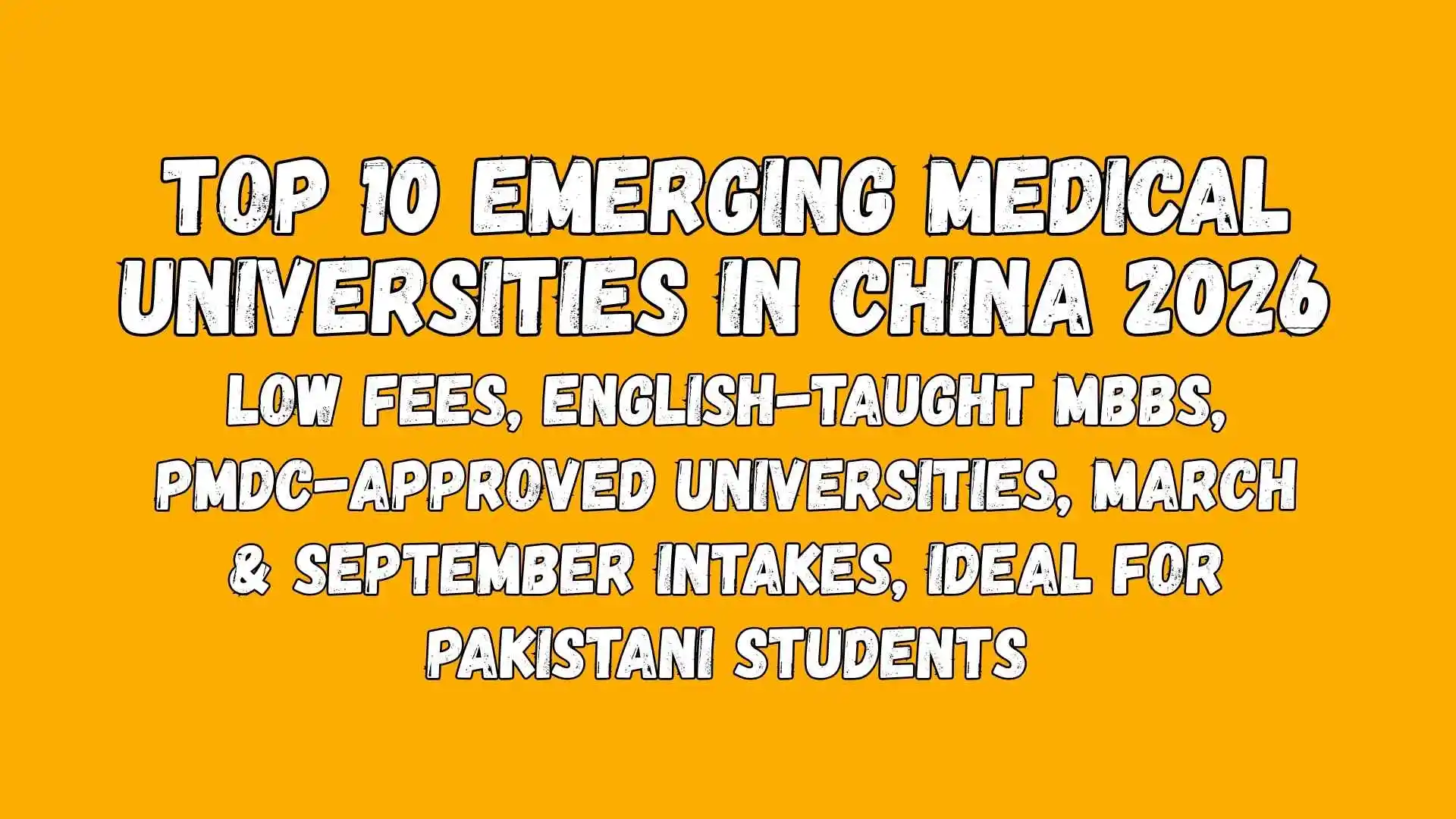Life of Pakistani Students During MBBS in China
Home > Life of Pakistani Students During MBBS in China

Life of Pakistani Students During MBBS in China
Studying MBBS in China has become a top choice for many Pakistani students because of its affordable fees, modern universities, and internationally recognized degrees. But beyond academics, what is daily life actually like for Pakistani students during MBBS in China?
This guide shares real student experiences, common challenges Pakistani students face, and practical tips to help you prepare for your journey. From hostel living, halal food, and cultural differences to language barriers and making friends — we cover everything that shapes the life of a medical student in China.
Whether you’re a student planning to apply or a parent looking for peace of mind, this guide will give you a full picture of what to expect and how to succeed in your MBBS journey abroad.
Academic Life in Chinese Medical Universities
MBBS in China Curriculum Structure
The duration of MBBS programs typically covers 6 years. The curriculum is designed to train students by providing a strong understanding of basic medical science, clinical subjects, lab work, and real hospital experiences.
There are 12 semesters in MBBS, each lasting 6 months. Below is the year-to-year breakdown of the MBBS in China curriculum.
Year 1: Basic Medical Sciences & Chinese language
Semester 1-2
- Medical Chemistry
- Physical Sciences
- Human Anatomy
- Physiology
- Biostatistics
- Cell Biology
- Chinese language
Year 2: Foundation of Medical Knowledge
Semester 3-4
- Pathology
- Immunology
- Biochemistry
- Pharmacology II
- Microbiology
- Medical Statistics
Year 3: Early Diagnostics & Pathology
Semester 5-6
- Medicine
- Gynecology
- Dermatology
- Medical Genetics
- Human Parasitology
- Pediatrics
- Obstetrics
Year 4: Hospital Exposure & Clinical Subjects
Semester 7-8
- Medical Chinese
- Epidemiology
- Diagnosis
- Surgery
- Neurology
- Forensic Pathology
- TCM
- Infectious Diseases
Year 5: Specialized Clinical Subjects
Semester 9-10
- Senior Clerkships
- Medicine
- Surgery II
- Cardiology
- Obstetrics & Gynecology
- Pediatrics
- Emergency Medicine
Year 6: Full-time Hospital Internship
- Start rotation in major departments
- Handle case studies
- Prepare for licensing exam

Class Hours & Daily Study Routine
The classes are conducted from Monday to Friday. Sunday is almost off in major Chinese universities, but some universities still offer extra classes and a day off.
The study hours for MBBS in Chinese universities are 5–7 hours. The class generally starts at 8:00 AM and ends at 12 PM.
Each class is for 1 hour, and 3–4 learners are included. Sometimes lab work or practical sessions are included in the afternoon 2:00 PM to 5:00 PM.
After that, students have a lot of time to self-study to complete preparation, notes, and assignments.
Attendance is a minimum of 80–75% and is strictly monitored by universities.
English-Medium Study & Clinical Learning Environment
- All classes are taught in English – Pakistani students can learn easily without needing to know Chinese.
- Teachers use simple methods – Lessons include videos, diagrams, and medical examples to help understanding.
- Clinical training starts from the 3rd year – Students visit real hospitals to see how doctors work with patients.
- Interactive classroom learning – Students join group work, ask questions, and give short presentations.
- Chance to interact with Chinese students – Especially during hospital rounds and language classes.
- Exams are simple and regular – Includes written papers, short quizzes, and sometimes oral exams.
- Small class tests help you improve – Regular assessments help students prepare for final exams step by step.
Hostel Life Experiences of Pakistani Students During MBBS in China
MBBS in China, Pakistani students' accommodation experiences are very positive as it is well-managed and budget-friendly. There are many types of accommodation options available for students, including:
On-Campus Accommodation
Generally more preferred among students as it is located inside the university and doesn't require spending money on transportation.
Most dormitories in medical colleges are shared among 3 roommates. The rooms are fully furnished with an attached washroom, an installed air conditioner, and strict safety monitoring.
Boys & girls have separate buildings, and most Muslim international students get given the option of shared rooms.
Off-Campus Accommodation
Many Pakistani students share rental apartments near the university. Each student pays their part of the rent.
Off-campus accommodation is preferred by students in the final year of their MBBS program who want more privacy.
It is also suitable for students who prefer self-cooking, especially since most campus hostels don't allow it. All basic facilities are usually available, but the level of safety is generally lower.
Food Experience in China: A Major Cultural Shift
One important part of student life in China is food availability and cost. You will see a lot of Halal restaurants and food markets offering Muslim goods including Indian, Pakistani, and Turkish meals.
Halal food stalls are especially common in urban cities where students enjoy quality and delicious meals. The food expenses in China generally depend upon the city and lifestyles.
A larger number of restaurants and street food stalls are available at relatively cheaper rates. Many students often go out with their classmates or dorm mates to eat outside the campus, because of the quality of food and large menu availability.
If you eat all meals in the university canteen, it will cost around 20 RMB per day. In comparison, dining outside the campus costs around 40 RMB per day which is a bit higher.
Dining Out
The average meal at Chinese restaurants typically costs $3 to $7 USD (PKR 800 to PKR 2,000).
The average per month total expense of dining out food can cost around $300 to $500 USD (PKR 83,500 to PKR 139,300).
Self-Cooking at Home
The average cost for meals and groceries typically ranges from $150 to $300 per month (PKR 41,767 to PKR 83,500).
Many Pakistani students choose to cook for themselves to save money and enjoy halal food at home.
Cultural Differences and How Pakistani Students Adapt
Chinese locals have very respectful and friendly behaviour towards Pakistani students. They value Muslim people and their religious practices. They even participate in their Muslim class fellow’s religious events like Ramazan or Eid.
The large number of Indian students studying MBBS in China is very strong, with their Pakistani fellows. The cultural immersion of China is incredible. You get a chance to explore the rich history, savor the original local cuisine, and learn Mandarin, a language that opens doors to countless opportunities.
China is not only known for its academic education; it also offers you the chance to explore China’s rich culture and beautiful places, such as the Great Wall of China, Mount Huangshan, Jiuzhaigou Valley, and many more.
Language Barrier: How Hard Is It?
Mandarin is the main language in China, but most MBBS classes for international students are taught in English. However, outside the classroom, daily life often requires basic Mandarin – especially in markets, hospitals, and local shops.
Many students struggle during hospital rotations where patients and doctors speak only Mandarin. But students manage by using apps like WeChat Translate, Google Translate, and learning basic phrases.
Over time, students pick up simple Chinese words to help them shop, travel, or talk to locals. Learning some basic Mandarin before arriving in China is very helpful. It not only helps in daily life but also shows respect for the local culture.
Challenges Faced by Pakistani MBBS Students in China
- Missing family and dealing with homesickness
- Language difficulties, especially during hospital internships
- Internet issues, as websites like Google, YouTube, and WhatsApp are blocked
- Academic pressure, especially before exams and during clinical years
- Visa renewal, which can sometimes be stressful
Students overcome these problems through study groups, talking to family through VPN apps, and support from senior Pakistani students.
Real Student Quotes
– Ahsan, 3rd-year student
Yes, most universities offer separate and secure hostels for female students with CCTV and security guards.
Yes, halal restaurants and food markets are available in almost all major Chinese cities.
Many Chinese medical universities are approved by the PMC. Always check the latest list on the official PMC website.
Life is a mix of study, hostel routine, self-cooking, and weekend travel. Students attend classes during the week and spend free time with friends, exploring the city or joining student communities.
Some common challenges include Mandarin language barriers, adjusting to food, missing family, and internet censorship (like no access to WhatsApp or YouTube without VPN).
Planning to study MBBS in China in 2025?
Soft Consultants can help you choose a PMC & WHO-approved university, get verified admission, and provide complete pre-departure support.
Fill out the form now to receive a FREE PDF of “MBBS Life in China – Survival Guide 2025.”
Apply Now
Table of Contents
-
17 Jan 2026 UncategorizedStudent Life in China for Pakistani Students 2026 Guide
-
15 Jan 2026 UncategorizedTop Masters in Turkey STEM Programs 2026 with Scholarships
-
14 Jan 2026 UncategorizedChinese MBBS Degree Recognition in Europe, Gulf & Middle East (2026)
-
13 Jan 2026 UncategorizedStudent Accommodation in China for MBBS/BDS: Costs, Cities & Tips 2026
-
12 Jan 2026 UncategorizedTop Turkish Universities Accepting Students Without IELTS/TOEFL (2026)
-
09 Jan 2026 UncategorizedEmerging Medical Universities in China 2026 – Low Fee MBBS for Pakistanis
-
08 Jan 2026 UncategorizedMBBS in China March 2026 Intake | Complete Guide for Pakistani Students
-
07 Jan 2026 UncategorizedGap Year Strategy 2026 for Pakistani Students | Study Abroad Guide
-
06 Jan 2026 UncategorizedMBBS & BDS in Kyrgyzstan 2026: Eligibility, Fees & Admission Guide for Pakistanis
-
05 Jan 2026 UncategorizedBDS Abroad with Low Marks or Gap Years | Soft Consultants












